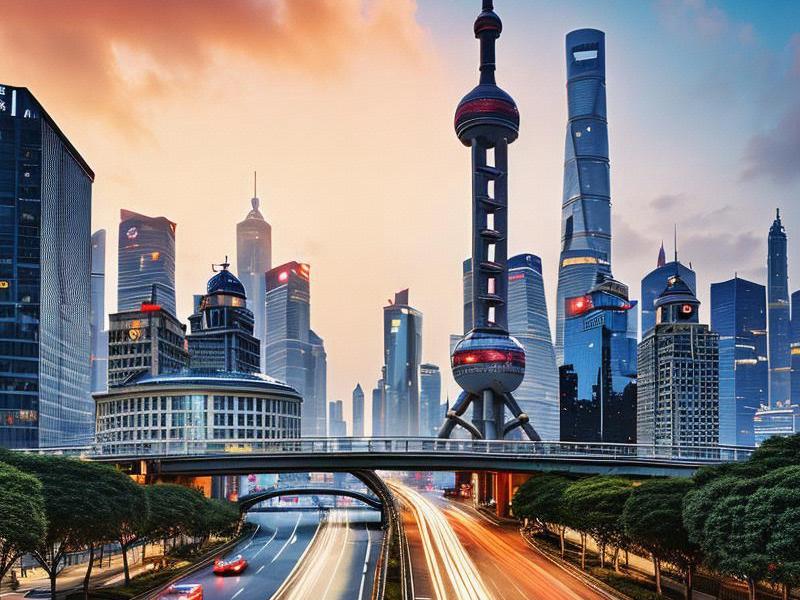
Shanghai, the bustling financial capital of China, stands as a testament to the nation's remarkable transformation over the past few decades. This vibrant city, with its skyline punctuated by the iconic Oriental Pearl Tower and the futuristic Shanghai Tower, is not just a symbol of China's economic prowess but also a beacon of cultural exchange and innovation.
The story of Shanghai is one of contrasts and coexistence. On one hand, it is a city that has embraced globalization, with its skyline a reflection of the modern world's architectural marvels. On the other hand, it is a city that cherishes its rich cultural heritage, with the ancient lanes of the French Concession and the tranquil gardens of Yu Garden offering a glimpse into its storied past.
Shanghai's urban development is nothing short of extraordinary. The city has successfully navigated the challenges of rapid growth while preserving its unique character. The Bund, once a symbol of colonialism, has been transformed into a waterfront promenade that showcases the best of Shanghai's architecture, both old and new. The Pudong area, on the other side of the Huangpu River, is a testament to the city's ambition and vision, with its skyline dominated by some of the tallest buildings in the world.
Innovation is at the heart of Shanghai's identity. The city has established itself as a global hub for technology and finance, attracting some of the world's leading companies and startups. Zhangjiang Hi-Tech Park, often referred to as "China's Silicon Valley," is home to numerous high-tech enterprises and research institutions. The city's commitment to fostering innovation is evident in its initiatives to support entrepreneurship, protect intellectual property, and invest in cutting-edge research and development.
爱上海419论坛 Culturally, Shanghai is a melting pot of influences. The city's history as a trading port has left an indelible mark on its culture, resulting in a unique blend of Chinese and Western traditions. This cultural fusion is reflected in the city's cuisine, fashion, art, and music. From the Michelin-starred restaurants serving traditional Shanghainese dishes to the avant-garde galleries showcasing contemporary art, Shanghai offers a rich cultural experience for residents and visitors alike.
The city's art scene is particularly noteworthy. Shanghai Museum, one of the largest and most prestigious museums in China, houses an impressive collection of Chinese art, including ancient ceramics, calligraphy, and paintings. The Power Station of Art, a former power plant turned contemporary art museum, has become a landmark for the city's artistic community. These institutions, along with numerous smaller galleries and cultural venues, contribute to Shanghai's reputation as a cultural capital.
Fashion is another area where Shanghai excels. The city hosts several international fashion weeks, attracting designers, models, and fashion enthusiasts from around the world. The Shanghai International Fashion Fair is one of the largest fashion events in Asia, showcasing the latest trends and innovations in the fashion industry. The city's fashion scene is characterized by a blend of traditional Chinese elements and modern Western styles, reflecting the city's cosmopolitan nature.
上海龙凤419贵族 Music and performing arts also play a significant role in Shanghai's cultural landscape. The Shanghai Grand Theatre, a state-of-the-art venue, hosts a wide range of performances, including opera, ballet, and symphony concerts. The city's jazz clubs and live music venues offer a more informal setting for enjoying live music, with performances ranging from traditional Chinese music to contemporary international acts.
Shanghai's commitment to sustainability and environmental protection is another aspect of its urban development. The city has implemented various initiatives to reduce pollution, promote green energy, and improve public transportation. The Maglev train, which connects Pudong International Airport to the city center, is a prime example of Shanghai's investment in sustainable transportation. The city's extensive network of metro lines provides efficient and environmentally friendly travel options for its residents.
Education is a cornerstone of Shanghai's development, with the city boasting some of the best universities and research institutions in China. Fudan University and Tongji University are among the most prestigious institutions, attracting students and scholars from around the world. These institutions contribute to Shanghai's reputation as a hub for academic excellence and innovation.
爱上海419论坛 Tourism is a significant contributor to Shanghai's economy, with millions of visitors flocking to the city each year to experience its unique blend of culture, history, and modernity. The Bund, with its stunning views of the Huangpu River and the Pudong skyline, is a must-visit destination. The Yu Garden, a classical Chinese garden, offers a tranquil escape from the hustle and bustle of city life. The Shanghai Tower, the tallest building in China and the second tallest in the world, provides breathtaking views of the city from its observation deck.
In conclusion, Shanghai is a city that embodies the spirit of China's transformation and its aspirations for the future. Its rapid urban development, commitment to innovation, rich cultural heritage, and dedication to sustainability make it a global metropolis of distinction. As Shanghai continues to evolve, it remains a symbol of China's progress and a testament to the power of human ingenuity and determination.
